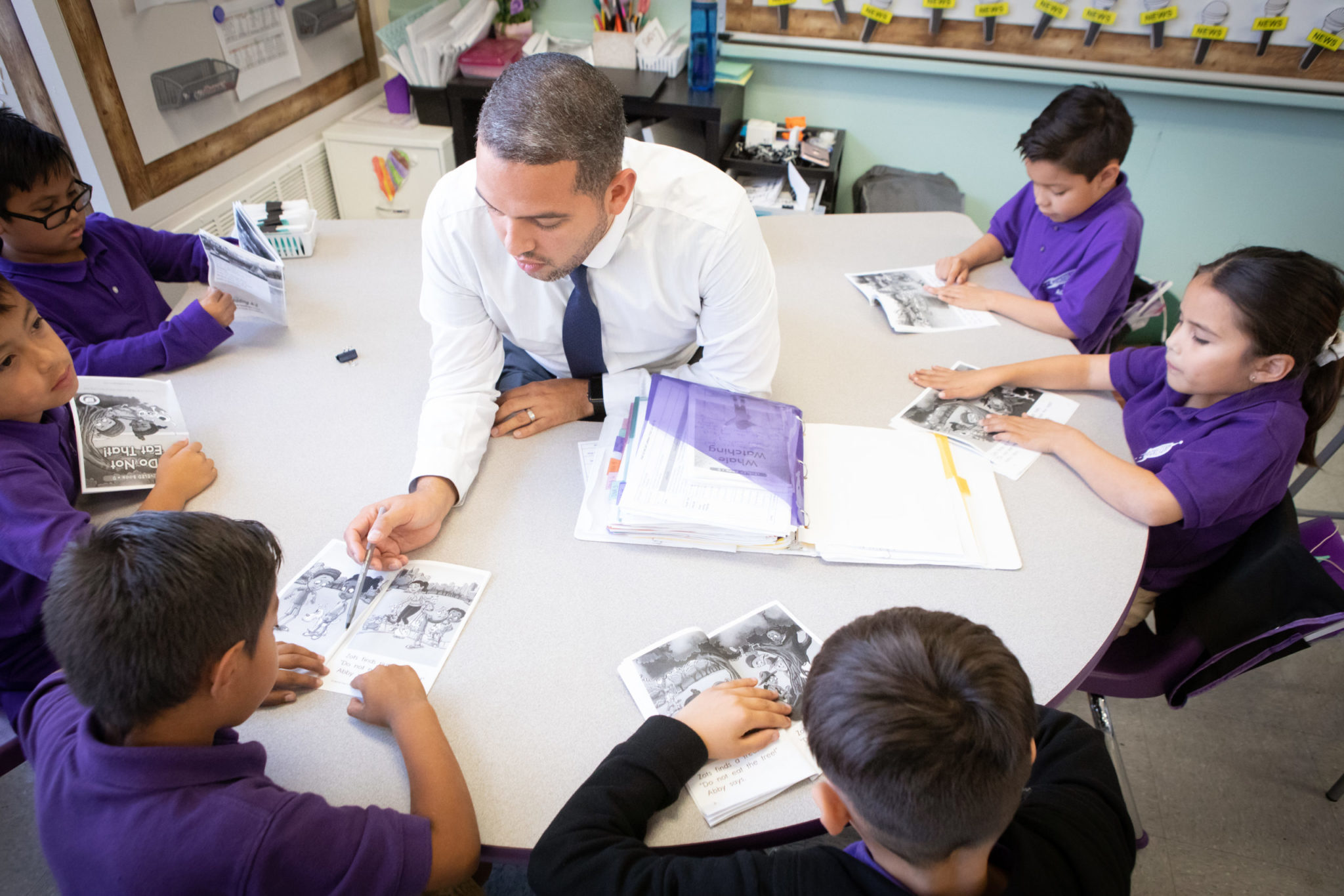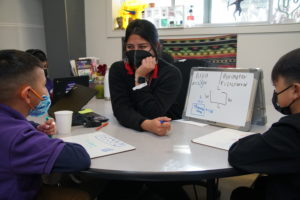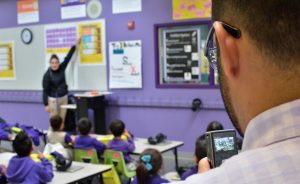
5 Ways School Leaders Can Coach and Support Teachers
By Kane Koller, Manager of Professional Development
Whether you’re new to the classroom or looking to take your skills to the next level, teachers greatly benefit from consistent, professional coaching. Having a 1:1 teacher-coach relationship helps teachers learn new skills, set and reach goals and be fully prepared for lessons ahead. It also ensures teachers have support to troubleshoot areas of concern and build their ability to analyze student data so the class stays on track and struggling students are supported.
As a non-profit charter network heavily focused on professional development, we generally recommend coaches observe and provide written feedback, deliver in-the-moment feedback (i.e. speaking into an earpiece the teacher wears during instruction), model instruction, and engage in co-observations with the teacher by watching videos or observing an exemplar teacher. We’ve also found it’s important to carve out ample time for weekly professional development, which is why we recommend coaches provide at least four hours of support each week to each teacher. For comprehensive support, teachers can be observed at least twice a week, receive at least two hours of professional development per week and have a weekly one-on-one meeting with their coaches to help unleash their potential so their students can reach their own.
Amidst our coaching, we’ve found the following are critical for a successful teacher-coach relationship and hope they help you become a strong school leader.
1. Build trust and strong relationships with each other.
Before you begin coaching, get to know your teachers as people. What drew them to education and this particular school? What inspires them? What they’re nervous about? Take time during each session to build your relationship authentically, so you understand how to best support them when challenging times arise.
2. Host 1:1 meetings each week.
This regular cadence gives coaches the opportunity to troubleshoot any issues that surface in the classroom, role play lessons for the upcoming week, and review how the teacher is growing and meeting their goals. This is also a great space to set new goals. You may want to find additional time to accomplish these goals aside from your 1:1.
3. Collaboratively prepare for units in advance.
Designed curriculums help educators build foundational skills by focusing on how to effectively deliver lessons and manage a classroom with an educational strategy that’s proven to help students excel. As a coach, you’ll provide your teachers with unit plans, scope and sequences, and daily exemplar lesson plans so they can see what success looks like. However, there’s still plenty of work to be done by the teacher on their own.
We recommend coaches and teachers meet for about 90 minutes two weeks in advance of a new unit to collaboratively create a strategy. This time ensures teachers and coaches are prepared with a deep understanding of the unit’s content and are equipped with strategies to teach conceptually. They’ll also form a mutual understanding of the bar set by the unit assessment, what students will need to be successful, and what the bottom lines of the lessons are. Together, they’ll also plan for modifications that may be required to meet the strengths and needs of their students.
4. Review lesson plans each week.
Have teachers submit lesson plans they’d like reviewed a week in advance. In your one to one meeting, coaches should provide constructive feedback for any adjustments needed. Some typical things to hone in on are alignment, rigor, and differentiation, which are critical components to any strong lessons. Let’s break this down a bit. In alignment, honing in on how the lesson activities match up with the objectives is key. In terms of rigor, ask yourself if students are doing an appropriate amount of cognitive work and ensuring that work is “high-level.” In the context of differentiation, take time to examine how English learners, those with specialized needs, or advanced students have opportunities to both receive adequate learning supports and demonstrate their mastery. After you review the lesson, practice it, or focus on any specific part the teacher isn’t feeling completely confident about.
5. Role-play lessons.
Whether you’re preparing for an entire unit or an individual lesson, role-playing helps teachers build and practice skills in a comfortable, constructive environment. As a coach some key things to keep in mind while conducting role-playing are:
-Time Your Role Play: Not only do you want to be efficient when practicing, but you want to be aware of your economical use of language. Have a set time limit with your partner.
-Hone In On the Skill: You want to try to isolate the skill or part of the lesson you feel least confident about. Guide your partner(s) to align their feedback around that.
-Practice Multiple Times: The old adage about “practice makes perfect” is true, but don’t just get it right once. Practice “until you can’t get it wrong” instead. That increases both your confidence and your ability to perform when you’re actually doing it.
Implement Feedback In The Moment: Similarly to the above, don’t just do it once and receive feedback. Do it again and implement the feedback in the moment, so it sticks.
With a combination of thoughtful planning, relationship building, and careful review, school leaders can truly accelerate the skill set of their teachers and the power and effectiveness of their coaching meetings.
While these have been effective modalities for Rocketship, these are just some of the many things school leaders should keep in mind while helping teachers grow. We’re constantly looking for ways to improve our professional development practices. As we discover new, effective ways we’ll be sure to share those here with you.
Published on September 26, 2020
Read more stories about: Uncategorized.
In the Classroom
How to Improve School Culture
Jeremiah Davis, Paraprofessional, Rocketship Dream Community Prep | March 3, 2025
Ready to ramp up moral at your school? Weave these nine celebrations into your school year!
Read more ⟩How Coaching in Schools Improves Outcomes
Rockesthip Public Schools | Feb 4, 2025
Learn how live coaching and weekly feedback sessions can help your teachers feel more supported year round!
Read more ⟩Parent Conference Tips for First Year Teachers
Jeremiah Davis, Paraprofessional, Rocketship Dream Community Prep | January 6, 2025
Looking for top parent conference tips? Prepare with advice from our educators.
Read more ⟩First Year Teacher? Here are Five Mistakes to Avoid.
Jeremiah Davis, Paraprofessional, Rocketship Dream Community Prep | November 1, 2024
See what mistakes most first year teachers make and how you can get ahead this school year with some simple tips from a fellow educator.
Read more ⟩3 Classroom Systems New Teachers Swear By
Rocketship Public Schools | Sept. 30, 2024
As a first year teacher, establishing a smooth and productive classroom environment can feel a tad overwhelming. Thankfully, these simple strategies can go a long way.
Read more ⟩How Co-Teacher Collaboration Can Benefit Your Classroom
Featuring Alejandra Chavez, Education Specialist at Rocketship Mosaic Elementary | June 10, 2024
Hear from Ms. Aly about how a small team of educators can make a big difference in student outcomes through thoughtful planning, focused collaboration, and personalized accommodations. Ms. Aly was one of our highest-performing educators in California for the 23-24 school year.
Read more ⟩How to Spark Joy in ESL Classrooms with a Multilingual Learning Clubhouse
Featuring Ms. Amy De La Rosa, Multilingual Specialist, Nashville Northeast Elementary | June 1, 2023
Listen in to an audio interview with Amy De La Rosa, a Multilingual Specialist who has worked as an educator for over 14 years and found an innovative way to help her students learn English in a more accelerated, playful way.
Read more ⟩Supporting Parents of Multilingual Students in Family/Teacher Conferences
Emma Volpe, Rocketship United Academy | June 1, 2022
Get thoughtful insight on how to create a more inclusive family-teacher conference environment.
Read more ⟩5 Ways to Strengthen Relationships in the Classroom
James Cross, Assistant Principal, Rocketship Nashville Northeast Elementary | February 20, 2022
A new age of education calls for a new level of connection. Here are some key tips to strengthen relationships in your classroom this school year.
Read more ⟩5 Ways School Leaders Can Coach and Support Teachers
Eesir Kaur, Director of Professional Development | October 15, 2020
Are you a school leader looking to coach your teachers more effectively? Here's what works for us.
Read more ⟩













